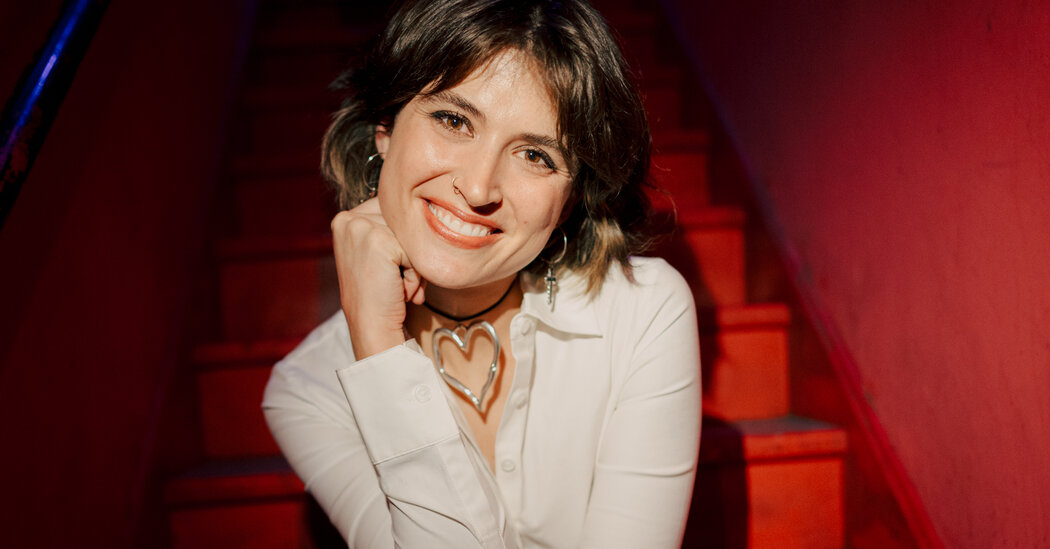A flock of mostly 20-somethings gathered on Tuesday night in a chapel-like building in Brooklyn to hear about a subject that has been a hot topic in religious spaces for centuries: celibacy.
Except no one was using that term. Instead, they were calling it “boysober.”
“I hate the word celibacy,” said the host of the event, Hope Woodard, a comedian and storyteller who grew up in the Church of Christ in rural Tennessee.
Ms. Woodard, who lives in Brooklyn, described herself as sex-positive — and sometimes wears a button that says “I heart female orgasms” to prove it. But after taking inventory of her dating life in October, and realizing that she had been in a relationship of some kind since kindergarten, she decided to take a year away from sex and dating.
With nearly half a million followers across TikTok and Instagram, Ms. Woodard, 27, started using the term “boysober” at the start of her journey. Now she is describing the experience in a monthly storytelling and comedy show, called “Boysober,” at Purgatory, an entertainment venue in Brooklyn’s Bushwick neighborhood that was once an administrative building of the Evergreens Cemetery.
At the first sold-out show, the approximately 100 attendees filled the seats and crowded around the small stage. Before introducing the lineup of comics, Ms. Woodard explained that she intended “boysober” as an all-encompassing term, one that meant abstaining from romantic relationships with people of any gender.
The audience of mostly women and nonbinary people often burst into knowing laughter as the comedians told stories about inconsiderate partners who had left pubic hairs on the toilet seat; offered an unrefrigerated cheese stick from their back pocket; and invited a different woman to a Halloween party they had planned on going to together.
During her time at the mic, Ms. Woodard described moments when she was the villain of her own dating story — times when she had led someone on, or had allowed herself to be treated poorly because she wanted attention.
A highlight was her story about going back to Tennessee and spending time with her grandmother, who has dementia. During the visit, she noticed that her grandmother kept sending texts to her ex — that is, Ms. Woodard’s grandfather — and grew angry when he didn’t reply. The thing is, her grandfather is dead.
“I’m like, ‘Mimi, you are going to be left “on read” till your grave!’” Ms. Woodard told the crowd, using a term for a text not responded to.
And yet, she recognized herself in that moment.
“Do you ever see your mom or your grandma doing something and you’re like, ‘that’s messed up’” — Ms. Woodard used a stronger word — “but then you’re like, ‘I know I’ve got that inside of me’?”
A big part of the yearlong break from sex and romance is unlearning the unhealthy relationship patterns that often get passed down from generation to generation. “Maybe we are one of the first generations of women where we don’t actually have to plug into a man for, like, energy and power and whatever,” Ms. Woodard said.
Eliza Wright, an events planner from Brooklyn who was in the audience, said she knew what it was like to take a break from men. After a few bad sexual experiences in college, she stopped having sex for a couple years, and in that time she realized she wasn’t attracted to men at all, she said. She then fell in love with her longtime best friend Jess. The two are now married.
Ms. Wright, 25, pointed to the pressure on women to earn male attention. “When that dissolves,” she said, “there’s a whole new world that opens.”
Ms. Woodard said that, growing up in the South, she was raised to please others. Now, she said, she sometimes struggles with knowing what she wants. At its core, her “boysober” year is about learning how to say no.
“I’m a little bit angry at myself and angry at all the sex that I’ve had that I feel like I didn’t choose,” she said. “For the first time ever, I just feel like I have ownership over my body.”
Catie Kobland, 24, a nanny and graduate student in Manhattan who attended the event, said that she and her friends “go celibate” every so often.
“When you get out of a relationship, or you have a really bad situationship and dating or seeing people is tainted, and you want to rinse it from your mouth, I feel like the best way to do it is celibacy,” Ms. Kobland said. “It’s this year’s hottest mental health craze.”







